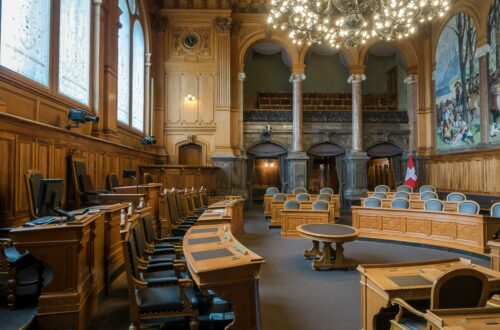
Editorial | Volume 24 No. 1
Dear Readers and Friends,
It is too early to historicize the Covid years and the health crisis remains present in many parts of the World. Rather than treating the Covid era as a clear-cut chapter of exceptionalism that will just come to an ‘end’, our new Special Issue hence draws attention to continuities. Twelve contributions by stellar scholars from around the globe explore ‘The Resurgence of the State as an Economic Actor’ through the prism of the Covid years—which in many ways amplified and accelerated a pendulum swing back to heightened state planning and intervention. States sought control of global value chains, restricted exports of critical commodities, intensified the scope of state-owned enterprises (SOEs), turned to subsidies and other economic policies.
Indications are many that this marks a new era of geo-economics conflicts that challenges the essence of rules and institutions of international trade law. The cost-cutting imperative of just-in-time production that – enabled by law – dominated in recent decades is centered around the idea of fairly stable political, ecological, economic and logistical conditions and left value chains ill-equipped when these parameters erode. Within the EU for instance, the Green Deal’s reliance on critical raw materials and the resulting geo-economics scramble in new strategic sectors come to mind. In the US, the recent massive subsidies poured into key sectors of the U.S. economy e.g. through the Infrastructure and Jobs Act ($1.2 trillion) or the Chips Act ($ 252.7 billion) mark a departure from industrial policies subscribed to the free trade ideal.
The Special Issue shows the many faces of a return of the State, with a particular focus on subsidies and countervailing measures by governments as well as trade effects of SOEs—two issues that have stirred large controversies at the World Trade Organization and beyond. The articles in this collection offer one of the most comprehensive overviews of this topic, putting to the fore different legal mechanisms and geographical and methodological perspectives. We are immensely grateful to our guest editor Leonardo Borlini for curating and pulling it all together! Within our journal, this issue was edited by Matthias Goldmann, as capstone after steering the Special Issues within GLJ for the past years with tireless energy and vision.
The first few contributions contextualize the stakes and regulatory trajectories of a resurgence of the State through subsidies and SOEs. In his introduction, Leonardo Borlini shows how existing multilateral trade rules struggle with easing conflicts that are caused by new state interventionism and shifting patterns of the global economy, as experienced during the Covid-19 pandemic. Taking on the possible future design of subsidies and SOEs treaty regulation, Giorgio Sacerdoti and Leonardo Borlini, in their contribution, call for a ‘spirit of pragmatism’ in addressing the deep and systemic challenges to the multilateral trading system, especially in a climate of increasing politicization of trade relations. Anne Orford asks how the ‘battle for the State’, its political vision, economic order and representation, is changing within the WTO in this new era of international trade. Especially critics of the system of international trade should resist the temptation to apply established lines of criticism all too easily to the present situation. Leonardo Borlini’s contribution subsequently turns to extant multilateral trade rules and relevant caselaw on subsidies and state enterprises to dissect their enduring problems and emerging deficiencies and lay the ground for investigating the direction taken by future possible reforms.
A second set of contributions provides country/region-specific illustrations of the new forms of economic statecraft. Thomas Schoenbaum’s contribution explores gaps between ‘Promise and Reality’ of the Biden Administration’s trade policies—arguing that despite the return of rhetoric of multilateralism, there are important and problematic continuities from the Trump era that should be reversed. Ming Du’s article zooms in on the nature of China’s state capitalism to discuss what trade rules might be needed to counteract it, in particular as part of the Comprehensive and Progressive Agreement for Trans-Pacific Partnership (CPTPP). Nerina Boschiero and Stefano Silingardi provide an analysis of the latest EU trade agenda that centers ‘strategic autonomy’. This strategy, our authors argue, espouses a significant shift in the role of the State vis-à-vis the market. Next in the series of national/regional analyses is Aya Iino’s article on Japan and its Free Trade Agreements (FTA) as a possible tool to regulate subsidies. She argues that Japan’s and other FTAs serve as laboratories in the attempt to fill gaps in WTO rules. Lastly, Regis Simo takes a Global South perspective on the recent proliferation of Special Economic Zones (SEZs) as tools to boost export-oriented economies. In the African context in particular, the African Continental Free Trade Area (AfCFTA) Agreement created a complex multi-layered governance of SEZ.
The final set of contributions revolves around the grand normative questions underlying the Special Issue. Petros Mavroidis and André Sapir take the case of China to discuss what paths the WTO can take in dealing with heterogenous economic models. China’s accession to the GATT/WTO more than 20 years ago, at a moment of belief in a definite victory of economic liberalism, is largely a story of unfulfilled expectations, they argue, calling for new multilateral rules. Mitsuo Matsushita’s contribution exposes how different legal mechanisms currently send mixed signals towards State-owned enterprises. While many FTAs expect them to align with a private profit-motive, competition law doctrines place important limitations on their actions. Eleanor Fox concludes the Special Issue by exposing the relationship between competition law and trade law. Both fields deal with market restraints, created by private parties and the state, respectively. And yet, they have developed as silos, conceptually and institutionally, and it is time to integrate both, Fox argues.
We hope you are as excited as we are about this tour d’horizon of the future of international trade and its legal framework. On behalf of the Editors-in-Chief, as always, I wish you happy reading!
Klaas Hendrik Eller







